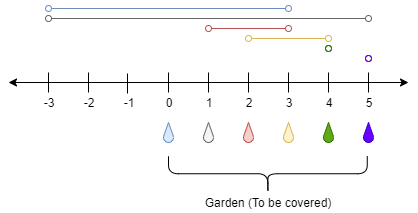Minimum Number of Taps to Open to Water a Garden
There is a one-dimensional garden on the x-axis. The garden starts at the point 0 and ends at the point n. (i.e The length of the garden is n).
There are n + 1 taps located at points [0, 1, ..., n] in the garden.
Given an integer n and an integer array ranges of length n + 1 where ranges[i] (0-indexed) means the i-th tap can water the area [i - ranges[i], i + ranges[i]] if it was open.
Return the minimum number of taps that should be open to water the whole garden, If the garden cannot be watered return -1.
Example 1:

Input: n = 5, ranges = [3,4,1,1,0,0] Output: 1 Explanation: The tap at point 0 can cover the interval [-3,3] The tap at point 1 can cover the interval [-3,5] The tap at point 2 can cover the interval [1,3] The tap at point 3 can cover the interval [2,4] The tap at point 4 can cover the interval [4,4] The tap at point 5 can cover the interval [5,5] Opening Only the second tap will water the whole garden [0,5]
Example 2:
Input: n = 3, ranges = [0,0,0,0] Output: -1 Explanation: Even if you activate all the four taps you cannot water the whole garden.
Example 3:
Input: n = 7, ranges = [1,2,1,0,2,1,0,1] Output: 3
Example 4:
Input: n = 8, ranges = [4,0,0,0,0,0,0,0,4] Output: 2
Example 5:
Input: n = 8, ranges = [4,0,0,0,4,0,0,0,4] Output: 1
Constraints:
- 1 <= n <= 10^4
- ranges.length == n + 1
- 0 <= ranges[i] <= 100
Solution:
class Solution {
public int minTaps(int n, int[] ranges) {
int[][] taps = new int[n + 1][2];
for (int i = 0; i < n + 1; i ++) {
taps[i] = new int[]{Math.max(0, i - ranges[i]), i + ranges[i]};
}
Arrays.sort(taps, (a, b) -> Integer.compare(a[0], b[0]) == 0 ? Integer.compare(b[1], a[1]) : Integer.compare(a[0], b[0]));
// for (int i = 0; i < n + 1; i ++) {
// System.out.print(Arrays.toString(taps[i]) + ", ");
// }
int end = 0, count = 1;
if (taps[end][0] > 0) return -1;
while (end < n + 1) {
int[] last = taps[end];
if (last[1] >= n) return count;
int prevEnd = end;
for (int j = end + 1; j < n + 1; j ++) {
int[] curr = taps[j];
if (curr[1] <= last[1]) continue;
if (curr[0] > last[1]) break;
if (curr[1] > taps[end][1]) {
end = j;
}
}
if (end != prevEnd) {
count ++;
} else {
break;
}
}
if (taps[end][1] >= n) return count;
return -1;
}
}